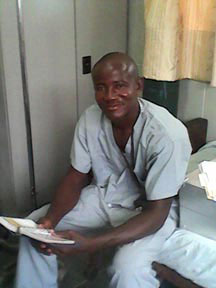Association for Respiratory Care Practitioners in the Philippines 10th Annual Meeting
September 25, 2014Respiratory Care Related Developments in the United Kingdom
December 10, 2014Michael D. Davis, BS, RRT
Richmond, Virginia
The first outbreak of Ebola Virus Disease (EVD) in West Africa occurred in March of this year. The outbreak began in Guinea (perhaps as early as December of 2013) and quickly spread to Liberia and Sierra Leone. When I arrived in Liberia, West Africa on June 3rd, there had not been a new case of EVD since mid-April and the outbreak appeared to be subsiding. That appearance proved to be deceiving on the 6th day of my trip.

On that day, I was driving to Redemption Hospital which is one of the clinical sites for the Liberian Respiratory Health Care Institute (LHRCI). As I turned down the street of Redemption, I called my colleague at that hospital to inform him of my “surprise” visit. He quickly cut me off, saying, “Don’t come”. He was treating an EVD patient who marked the resurgence of this outbreak in the middle of Monrovia, the capital of Liberia. Within a week, fourteen new cases were reported (eight of which were fatal). By the end of the month-long trip, over forty new cases had been confirmed with far more suspected. Monrovia rapidly became the epicenter of the new phase of the outbreak; Liberia exceeded one thousand EVD fatalities within the following sixty days during the worst EVD outbreak in history.
Healthcare workers are extremely vulnerable to EVD. During my trip, eight colleagues of mine were quarantined due to EVD exposure; four contracted the disease and two died. By early July, most hospitals and clinics in Liberia had closed (including the national hospital) either due to employees not reporting for work (out of fear of EVD) or inadequate containment facilities. All schools in the country, including the LHRCI, were closed as an attempt to prevent the spread of the disease.
Our respiratory therapy students and instructors desperately wanted to help. After obtaining personal protective equipment (PPE) from the Ministry of Health and Social Welfare (MoHSW), we partnered with one of the few healthcare centers that remained open and went to work providing both inpatient and outreach services. Using the skills they have learned during their clinical rotations, the students are working under the supervision of their medical director and clinical instructors to provide care to the public.
I am incredibly proud of the selflessness and bravery demonstrated by my friends, colleagues, and students during these hard times. In a country still recovering from decades of civil war, the devastation of the current outbreak is an exceptionally unfair insult; the eagerness of these people to help is truly touching.


